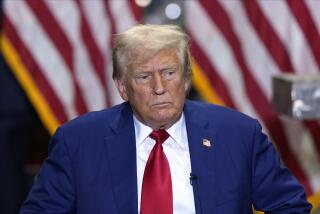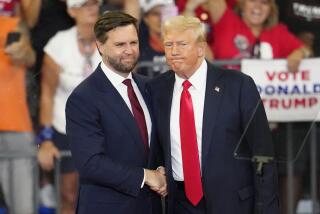Intelligence showed contacts between Moscow and Trump campaign last summer, former CIA chief says

Former CIA Director John Brennan tells a Congressional panel investigating Russian efforts to interfere with the 2016 U.S. election that he was concerned about Trump campaign officials interactions “because of known Russian efforts to suborn such in
Reporting from Washington — The CIA received intelligence last summer indicating Donald Trump’s campaign aides were in contact with Russian government officials, information that was worrisome enough to pass to the FBI for investigation, former CIA Director John Brennan said Tuesday.
Brennan said it wasn’t clear at the time if the Trump aides were acting as Russian agents or if the “contacts and interactions” were routine and unconnected to a larger effort by Russian intelligence agencies to influence the outcome of the 2016 election.
Brennan’s first public accounting since he stepped down in January shed new light on the political scandal that has dogged President Trump since before he took office and that now has spawned separate investigations by the FBI, four congressional committees, the Pentagon and a Virginia grand jury.
“I encountered and am aware of information and intelligence that revealed contacts and interactions between Russian officials and U.S. persons involved in the Trump campaign that I was concerned about,” Brennan told the House Intelligence Committee.
He said the intelligence “raised questions in my mind whether the Russians were able to gain the cooperation of those individuals.”
Brennan revealed that the U.S. government concerns about possible collusion were deeper than previously known and involved multiple contacts. He also made clear that the unease began long before the intelligence community publicly disclosed a joint conclusion in January, shortly before Trump’s inauguration, that Moscow had sought to help Trump win.
His testimony could intensify the clash between the CIA and Trump, who has repeatedly and angrily denied any personal dealings with Russia during the campaign. The rift has widened since the president disclosed highly classified intelligence, reportedly from Israel, to senior Russian diplomats during a May 10 meeting in the Oval Office.
At a separate Senate Armed Services Committee hearing Tuesday, Director of National Intelligence Dan Coats refused to confirm or deny a Washington Post report that the president asked him in March to publicly deny the existence of any evidence of collusion between the Trump campaign and Russia.
“On this topic, as well as other topics, I don’t feel it’s appropriate to characterize discussions and conversations with the president,” Coats said.
Trump reportedly made the same request to Adm. Mike Rogers, director of the National Security Agency. Both intelligence chiefs, the report said, refused to comply with Trump’s request, which they both deemed inappropriate. The White House has declined comment.
Trump last week denied reports that he had asked then-FBI Director James B. Comey to back off an investigation of Michael Flynn, Trump’s former national security advisor. Trump fired Comey on May 9.
The leaders of the Senate Intelligence Committee said Tuesday they were sending subpoenas to Flynn’s businesses, the Flynn Intel LLC and Flynn Intel Inc., seeking documents related to dealings with Russia before the election.
The move comes a day after Flynn’s lawyers refused to comply with a previous committee subpoena sent directly the retired three-star Army general, citing his constitutional protection against self-incrimination.
Sen. Richard M. Burr (R-N.C.), the committee chairman, and Sen. Mark R. Warner (D-Va.), the vice chairman, said they were issuing new subpoenas because companies can’t invoke the 5th Amendment.
Burr said the committee could recommend Flynn be charged with contempt of Congress for his refusal to comply with the original subpoena.
“I’ve said before everything is on the table,” Burr told reporters. “That’s not our preference today. We would like to hear from General Flynn. We’d like to see his documents. We’d like him to tell his story because he publicly said, I’ve got a story to tell.”
Brennan said he personally warned Russia to stop meddling in the U.S. campaign in an Aug. 4 telephone conversation with Gen. Alexander Bortnikov, the head of the Federal Security Service, Russia’s primary spy service.
Brennan said he told Bortnikov that the Russian operation, which involved hacking and leaking thousands of Democratic Party emails, “would be certain to backfire” because its disclosure would outrage Americans.
“It should be clear to everyone Russia brazenly interfered in our 2016 presidential election process and that they undertook these activities despite our strong protests and explicit warning that they do not do so,” Brennan said.
In addition to alerting the FBI last summer, which is responsible for counterintelligence investigations, Brennan said he created a special unit in the CIA to monitor and analyze intelligence about Russian’s interference in the election, inviting the FBI and the NSA to participate.
He said he also briefed senior members of Congress in August and September on the Russian meddling.
Rep. Trey Gowdy (R-S.C) pressed Brennan on whether there was “evidence of collusion” between Moscow and the Trump campaign.
“I don’t know whether or not such collusion — and that’s your term — such collusion existed,” Brennan answered. “I don’t know. But I know that there was a sufficient basis of information and intelligence that required further investigation by the [FBI] to determine whether or not U.S. persons were actively conspiring, colluding with Russian officials.”
In a statement issued from Rome, where Trump arrived Tuesday on the third leg of his overseas trip, a White House spokesman said the day’s hearings offered no evidence of campaign wrongdoing.
“This morning’s hearings back up what we’ve been saying all along: that despite a year of investigation, there is still no evidence of any Russia-Trump campaign collusion, that the President never jeopardized intelligence sources or sharing, and that even Obama’s CIA Director believes the leaks of classified information are ‘appalling’ and the culprits must be ‘tracked down,’” it said.
Brennan declined to name who the CIA believed was in contact with Russian authorities during the campaign last year. But he said the individuals may not have realized they were a target of Russian intelligence services.
“Frequently, individuals who go along a treasonous path do not even realize they are along that path until it gets a bit too late,” he said.
Comey told Congress in March that the FBI opened its counterintelligence investigation last July into whether Trump’s campaign associates deliberately coordinated with Moscow in what U.S. officials called an influence operation.
The Justice Department handed the FBI inquiry over to a special counsel, Robert Mueller III, last week to ensure its independence. The probe has broadened to include a criminal investigation into whether Flynn improperly accepted payments from entities associated with the Russian and Turkish governments.
Trump ordered Flynn to resign in February, barely three weeks into the new administration, after news reports disclosed he had lied to White House colleagues, including Vice President Mike Pence, about his communications with Sergey Kislyak, Russia’s ambassador to the United States.
Twitter: @davidcloudLAT
ALSO
Trump’s standing in polls has dropped: How significant is the slide?
Trump’s budget arrives in Congress with a lot of talk and little action
What a Montana congressional race will — and won’t — tell us about Trump and his political troubles
UPDATES:
3:20 p.m.: This story was updated with details of subpoenas for Michael Flynn
This story was first published at 1:15 p.m.
More to Read
Sign up for Essential California
The most important California stories and recommendations in your inbox every morning.
You may occasionally receive promotional content from the Los Angeles Times.











